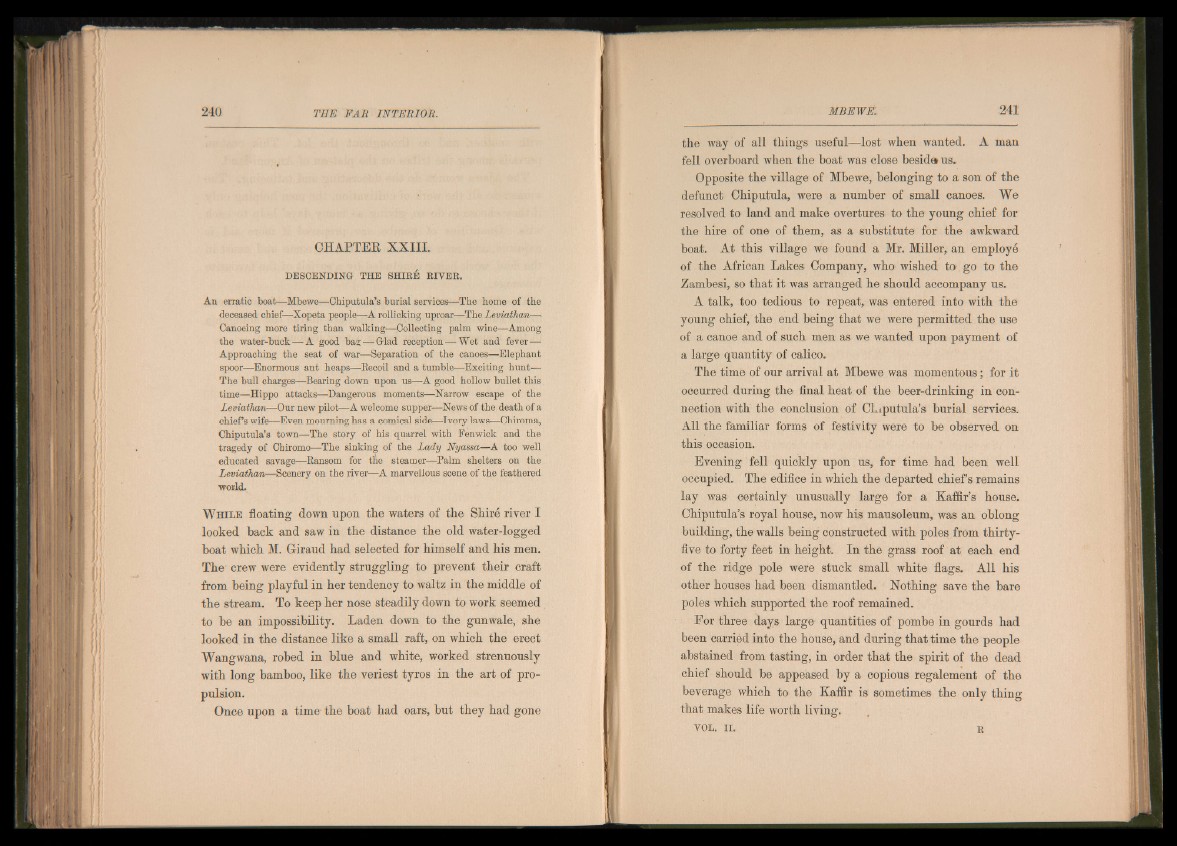
CHAPTER XXIII.
DESCENDING THE SHIRE RIVER.
An erratic boat—Mbewe—Obiputula’s burial services—The home of the
deceased chief—Xopeta people—A rollicking uproar—The Leviathan—•
Canoeing more tiring than walking—Collecting palm wine—Among
the water-buck—A good bag — Glad reception®-Wet and fever—
Approaching the seat of war—Separation of the canoes—Elephant
spoor—Enormous ant heaps—Recoil and a tumble—Exciting hunt—
The bull charges—Bearing down upon us—A good hollow bullet this
time—Hippo attacks—Dangerous moments—Narrow escape of the
Leviathan—Our new pilot—A welcome supper—News of the death of a
chiefs wife—Even mourning has a comical side—Ivory laws-—Chiroma,
Chiputula’s town—The story of his quarrel with Fenwick and the
tragedy of Chiromo—The sinking of the Lady Nyassa—A too well
educated savage—-Ransom for the steamer—Palm shelters on the
Leviathan—Scenery on the river—A marvellous scene of the feathered
world.
W h il e floating down upon the waters of the Shire river I
looked back and saw in the distance the old water-logged
boat which M. Giraud had selected for himself and his men.
The crew were evidently struggling to prevent their craft
from being playful in her tendency to waltz in the middle of
the stream. To keep her nose steadily down to work seemed
to be an impossibility. Laden down to the gunwale, she
looked in the distance like a small raft, on which the erect
Wangwana, robed in blue and white, worked strenuously
with long bamboo, like the veriest tyros in the art of propulsion.
Once upon a timo the boat had oars, but they had gone
the way of all things useful—lost when wanted. A man
fell overboard when the boat was close besida us.
Opposite the village of Mbewe, belonging to a son of the
defunct Chiputula, were a number of small canoes. We
resolved to land and make overtures to the young chief for
the hire of one of them, as a substitute for the awkward
boat. At this village we found a Mr. Miller, an employe
of the African Lakes Company, who wished to go to the
Zambesi, so that it was arranged he should accompany us.
A talk, too tedious to repeat, was entered into with the
young chief, the end being that we were permitted the use
of a canoe and of such men as we wanted upon payment of
a large quantity of calico.
The time of our arrival at Mbewe was momentous; for it
occurred during the final heat of the beer-drinking in connection
with the conclusion of CLiputula’s burial services.
All the familiar forms of festivity were to be observed on
this occasion.
Evening fell quickly upon us, for time had been well
occupied. The edifice in which the departed chief’s remains
lay was certainly unusually large for a Kaffir’s house.
Chiputula’s royal house, now his mausoleum, was an oblong
building, the walls being constructed with poles from thirty-
five to forty feet in height. In the grass roof at each end
of the ridge pole were stuck small white flags. All his
other houses had been dismantled. Nothing save the bare
poles which supported the roof remained.
Eor three days large quantities of pombe in gourds had
been carried into the house, and during that time the people
abstained from tasting, in order that the spirit of the dead
chief should be appeased by a copious regalement of the
beverage which to the Kaffir is sometimes the only thing
that makes life worth living.
VOL. II. b